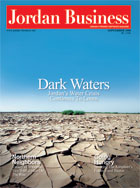 I had a little bit of free time today, and I happened to come across this article in the Jordan Business magazine that I found lying out in the street (it’s very recycling-friendly to “reuse” magazines that other people toss out of their windows). The author and his guest, His Eminence the former Minister of water/irrigation Hazem Nasser, definitely seem agree with my thoughts on Jordanian water loss and that it’s not hitting the locals hard enough here for them to realize that they’re in very real danger of dying of thirst if they don’t make a radical change in their consumption and reuse policies.
I had a little bit of free time today, and I happened to come across this article in the Jordan Business magazine that I found lying out in the street (it’s very recycling-friendly to “reuse” magazines that other people toss out of their windows). The author and his guest, His Eminence the former Minister of water/irrigation Hazem Nasser, definitely seem agree with my thoughts on Jordanian water loss and that it’s not hitting the locals hard enough here for them to realize that they’re in very real danger of dying of thirst if they don’t make a radical change in their consumption and reuse policies.
The average Jordanian consumes 170 cubic meters of water a day; a stark contrast to the 1,000 cubic meters consumed by the average citizen of a water-rich nation.
When I wrote about working in the Sheraton a couple weeks ago and finding jugs of bottled, filtered water in the trash with only a few sips gone, it just blew my mind that in a country that is estimated to be completely dry within 30 years (at the current rate) people would do something as wasteful as that. Nasser and the author are quick to jump on the idea that I’ve also heard around Jordan in a few weeks here, that agriculture is the most wasteful. You can read the article to get more the statistics about it, but it’s pretty eye opening.
[Agriculture] consumes 65% of available water while its contribution to the gross domestic product (GDP) has not exceeded 3%. In contrast, the industrial sector receives around 3% of available water and contributes at least 40% to Jordan’s GDP.
It’s articles like that which put me into a reflective mood about wasting energy. I just walked back home from church, from past the 6th circle all the way to the 3rd circle. It’s a trip that takes about 7 minutes to do by taxi (especially at the speeds they drive at) but took me an hour to walk. I didn’t mind; it’s a beautiful night out, I had my music, and I was filled with pizza after me and my school coworkers and I had a little get-together – I figured it would be good to walk off the calories. On the way back, taxi drivers honk insistently at you, trying to get your attention (and even louder if they see you’re wearing headphones, like I was), trying to goad you into getting into their vehicles. I’ve become adept at waving them off briskly as they slow down invitingly while driving past me. I think to myself, “Haven’t they ever seen anyone just want to WALK somewhere, instead of being ferried about?”
And then I realize – no, they might not have. As I walked home through the cool breeze, I was struck by how few people I saw. It was like walking the streets of my hometown of Brodhead, compared with my college of Madison – even though it is Ramadan, after Ifthar, on a perfect night – no one was walking outside, but the streets were packed with cars.
The mentioned about talks about subsidies on many public needs, water being the most obvious one. But also bread, too – I used to wonder how I could get away with buying 4 thick slices of khubiz (bread) every morning for 10 gersh (about 14 cents) – but then I learned that bread was subsidized by the government: for each slice that the breadmaker bakes, the King pays for about 2/3rds of it. Water is the same way.
What about public transportation? Should more money be put into the bus system here in Amman so less taxis will be needed? I always hated the bus system in Madison, but at least it was a viable option when you needed it. Here, the buses are slow, practically unmarked, and leave their docks “when they’re full” which in my mind kind of defeats the purpose of a metropolitan bus system.
See, I think about these things too much. I’ve only been in this country just over a month, and already I’m going into semi-political mode. I can’t even vote here; what the heck am I thinking? 😛 In any case, it will be interesting to see if any changes are made during the short time while I’m in the country. Although I think my protesting days are over while I’m a guest in King Abdullah’s country, that doesn’t mean that I won’t be cheering on progressive, conservation-minded action from the sidelines.


No one has commented on this post - please leave me one, I love getting feedback!
Follow this post's comments, or leave a Trackback from your site